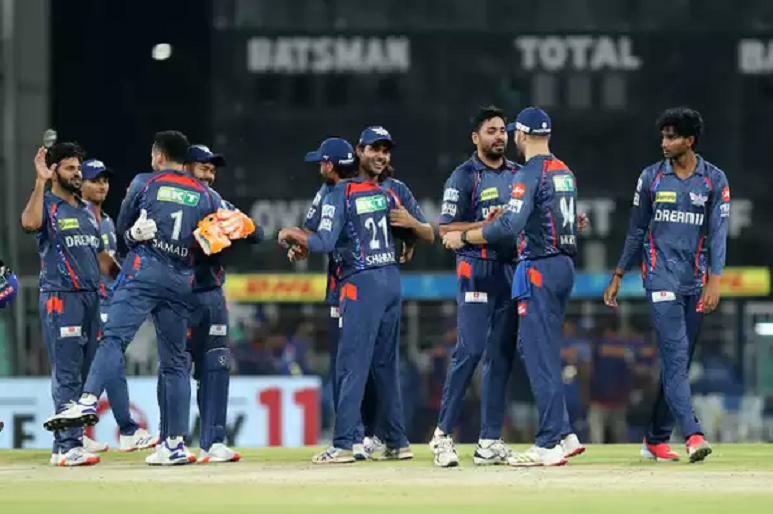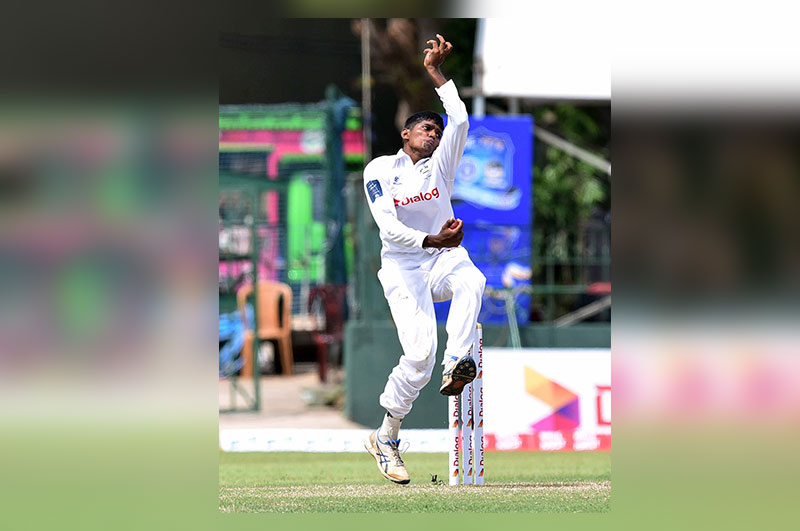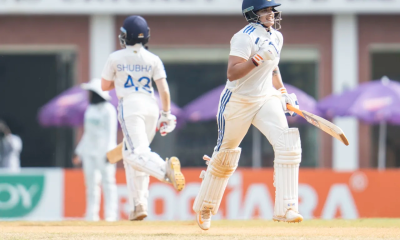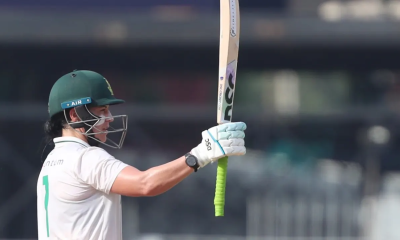Sports
A day to believe cricket is not just an American Dream

Saurabh Netravalkar moved to the United States in 2015. He was 23 and had accepted a difficult reality. He wasn’t going to be a professional cricketer.
“It was a very emotional call,” Netravalkar said in an interview last year. “I packed my bags and moved to the US to study. I never dreamt that I’d get to play cricket again. I didn’t even bring my cricket shoes.”
A decade later and Netravalkar is stood at the top of his mark in a World Cup, tasked with bowling the Super Over against Pakistan that will earn USA cricket the biggest win in their history.
“It’s a very humbling feeling that life has given me a second chance to pursue what I love doing,” Netravalkar said. “And I really feel that bliss as soon as I walk onto the field to play competitive cricket.”
As Netravalkar bowled, the bliss was evident. Ten minutes earlier, Pakistan’s Mohammad Amir, a veteran of over 100 international matches and a 2009 T20 World Cup winner, had lost his cool in a nine-ball over that went for 18. But Netravalkar, an eight-year veteran of Oracle Cloud Infrastructure, where he continues to work full time, held his nerve. Dot, four, wide, wicket and the match was done.
To this day, Netravalkar’s Twitter bio lists his role as a Principal Member of Technical Staff at Oracle, first, and Professional Cricketer at USA Cricket, second. It is time to swap those around.
For many, this result was a confirmation of what they already knew. That cricket’s potential in this country is immense, with the challenge being harnessing it.
Those facts were evident in the aftermath of Netravalkar sealing victory. A historic win, met with as much an outpouring of relief as an explosion of joy.
USA were full value for their win. And had they not crossed the line, the reaction wouldn’t have been pats on the back and better luck next time, but a side of quality professionals bereft at the opportunity they’d let slip. After the first eight overs of Pakistan’s innings, the visitors were 40 for 3. And with seven overs to go of USA’s, they were 104 for 1 with only 56 left to win.
In both instances, Pakistan pulled it back, but far from being a day belonging solely to Netravalkar, it was one that highlighted the depth of US cricket and the playing ability below the big names.
For all the noise of parachuted players like Corey Anderson who flipped nations after a successful international career with New Zealand, this was an Anderson-less victory. His sole contribution to the match was a single over that went for six runs.
Instead, the heroes were lesser known figures such as captain Monank Patel, who made 50 off 38 balls, Nosthush Kenjige and Nitish Kumar.
Kenjige, born in Alabama but raised in Karnataka, took 3 for 30 in his first match of the competition. He moved back to the States in 2015 and worked as a hospital technician. When he decided he wanted to requalify for the US as a cricketer, he’d work from 9-5 before driving to an indoor centre from 6-10 in order to complete the 800 hours of coaching that were necessary to prove to the ICC that someone had “a commitment to the local community.” This isn’t a team of people mumbling the national anthem with a new badge on their chest, but a group of players living out, if not their childhood dream, then their adult one.
That context applies to Nitish, who was born in Canada and represented them in the 2011 ODI World Cup as a 16-year-old, before switching nations in 2020.
World Cups provide the opportunity for people to live out their dreams, but they also offer the opportunity for people to live out their nightmares. And with one ball of USA’s innings to go, Nitish was experiencing the latter.
Arriving at the crease at No.5 with 49 required off 35 balls, he went boundary-less for a tortured 10 not out off 13. Off the final ball of the innings, he managed to chip a low full toss over mid-off and to the boundary to force a Super Over. He’ll remember this day for the rest of his life, and mercifully, for good reasons rather than bad.
However, throughout the hysteria and the joy, there was also a reminder of the challenges that cricket in the USA faces. Five days ago, Aaron Jones, who shone once again here with 36 off 26 before playing the defining batting role in the Super Over, inspired a roaring stadium with the innings of a lifetime.
The fist pumps that followed each boundary on Saturday night were back again this Thursday afternoon, but rather than revving up an adoring home crowd, they were defiant in the face of a more sparsely attended stadium consisting mainly of Pakistani supporters.
“We knew that we don’t have support from the crowd,” captain Patel said after play. “Pakistan had more support from the crowd and I thought it would backfire on them…they’ll be under more pressure.”
This World Cup in the USA is primarily about harnessing the interest that already exists here rather than expanding it. A position that carries with it pragmatic strengths, but blue-sky weaknesses.
For instance, the broadcaster carrying the World Cup in North America is Willow. A cricket specialist channel that if you’re an existing fan is gold dust as it carries almost any match that’s happening on the planet. But if you’re not an existing fan, you don’t even have the opportunity to accidentally scroll onto it as you’re flicking through channels. You won’t even know it’s not there.
America loves winners. But largely America doesn’t know it currently has one in its cricket team. Through Major League Cricket and the national side, they have the money and the quality to look after the short term of the game. And in growing diasporas such as the Nepali community that saw 5,500 people turn up to the middle of Texas to watch their match against Netherlands, they have the genuine interest and passion to look after it in the long term.
Far from just having the opportunity to grow the game, American cricket has a responsibility to, because if they get it right, this is a fairytale that’s only just beginning.
Latest News
Sears takes five again as New Zealand complete ODI series sweep over Pakistan

New Zealand kept their ODI record against Pakistan spotless as they eased to a 43 run win to seal a 3-0 series sweep.
After a nearly-two-hour delay to the start because of a wet outfield owing to overnight rain in Mount Maunganui, Michael Bracewell and Rhys Mariu’s half-centuries got New Zealand up to 264 in 42 overs. Pakistan made a slow start amid a freak injury to Imam-ul-Haq and while there were contributions right down the order led by a Babar Azam half-century, New Zealand never let Pakistan get on top of the asking rate. Five more wickets for Ben Sears saw New Zealand regularly chip away as Pakistan folded for 221.
For the third successive game, Mohammad Rizwan won the toss and decided to put New Zealand in. Naseem Shah came in for the concussed Harris Rauf and had an immediate impact, squaring Nick Kelly up to get an early wicket. But New Zealand consolidated with a 78-run stand between Mariu and Henry Nicholls, even if it wasn’t quite as explosive as New Zealand have been in the first powerplay this series.
Sufiyan Muqeem was introduced somewhat late in the game, but struck almost immediately, getting a fluid Mariu out for a half-century as he tried to sweep. But New Zealand continued to work their way through the innings sedately, building one partnership after another; five of the top six scored between 26 and 59. Tim Seifert and Daryl Mitchell combined for another 61-run stand as they geared up to give the lower-middle order a platform for a big finish.
It was captain Bracewell who made good on that platform in a blistering innings. He started slowly after coming in with just under 11 overs to go, but when he launched Mohammed Wasim over fine leg in the 34th over, it would be the first of a half-dozen sixes off his bat. Akif Javeed bore the brunt of the punishment, plundered for 18 in the following over as Bracewell hared towards his half-century. It would come in the final over of the innings with a fifth six of the innings against Akif; he would smash one more before Akif finally got his man off the last ball of the innings. It was his fourth wicket, but having smashed 59 off 40, Bracewell had what he wanted from his knock.
New Zealand’s quicks were tight up top once more and strangled Pakistan early, but the early stages of the game were defined by the injury to Imam. He nudged Will O’Rourke and set off for a single, but the throw at his end bounced up awkwardly and ended up lodging itself in the grill of Imam’s helmet. Imam went down immediately as the physio raced on. Extensive treatment followed as it became clear Imam would struggle to continue. He would be bandaged and wheeled off on a stretcher, with Usman Khan his concussion substitute.
Abdullah Shafique and Babar were steady through the early stages of the chase, but never as brisk as was required of them. Shafique’s innings was typically punctuated by quality shot-making, a pick-up of O’Rourke towards midwicket perhaps the highlight, but 33 off 56 was a truer indicator of how few and far between such aggression was. He failed to get on top of a short ball from Sears to give Jacob Duffy a comfortable catch in the deep; by now, the asking rate was approaching eight.
Usman’s innings ended with a moment of brilliance in the field from Bracewell – of the sort that has become their hallmark. Usman looked uncomfortable against the short ball as ever and skied one off Muhammad Abbas. Bracewell dashed in from midwicket, and it always looked like the ball would land just short, but a dive at full stretch saw him pluck the ball inches off the ground.
In a dagger blow to Pakistan, Babar followed swifty after, clipping one to deep midwicket immediately after bringing up his half-century. It became something of a theme for the innings; each of the top seven reached double-figures without making a more meaningful contribution to the chase. The captain Rizwan was the most proactive, looking good through a breezy 32-ball 37, but with wickets falling at the other end, Pakistan needed a bit more meat on the bones of that innings. But Duffy cleverly changed his pace and drew a miscue from him, leaving Pakistan a further 96 to win in just 56 with the top half back in the hut.
In the second game, the bottom half had bailed Pakistan out of an embarrassing defeat, primarily led by Faheem Ashraf. There would be no rescue act from the allrounder this time, Bracewell striking as he sliced to Seifert who took a sharp catch, and Naseem was only good for a brief cameo before the returning Sears put a stop to it.
By now, Pakistan’s hopes of victory were realistically over, and Sears made hay, taking three off the last four wickets – including the final one – to help himself to a second consecutive five-wicket haul. There was brief drama at the end of a long day when the lights went out just as Duffy was about to deliver to Tayyab Tahir, fighting a lone if purposeless hand at the end of the innings. When the lights came back on, though, he was gone next ball, and it would be under bright lights that New Zealand sealed glory, plunging Pakistan into ever-deepening gloom as they ended a miserable tour on a feeble note.
Brief scores:
New Zealand 264 for 8 in 42 overs (Michaell Bracewell 59, Rhys Mariu 58, Daryl Mitchell 43, Henry Nicholls 31, Tim Seifert 26; Akif Javed 4-62, Naseem Shah 2-54) beat Pakistan 221 in 40 overs (Babar Azam 50, Abdulla Shafiqe 33, Mohamed Rizwan 37, Tayyab Tahir 33; Ben Sears 5-34, Jacob Duffy 2-40) by 43 runs
[Cricinfo]
Latest News
IPL 2025: Marsh, Markram and Rathi shine as LSG edge MI in thriller

Hardik Pandya claimed his maiden T20 five-fer and scored an unbeaten 16-ball 28 but was powerless to prevent Mumbai Indians’ [MI] third loss in four games. They lost to a spirited Lucknow Super Giants [LSG] side, who had Mitchell Marsh and Aiden Markram to thank for powering them to 203, a score that they defended by 12 runs, thanks in large part to a superb spell from 25-year-old Digvesh Rathi, who took 1 for 21.
At the 15-over mark, the contest was evenly poised: LSG stood at 146 for 3, MI at 143 for 3. Mumbai, historically strong chasers, seemed on course for a late surge. But that’s when Rathi made his mark. The legspinner delivered a crucial spell, conceding just 10 runs from his first three overs. Skipper Rishabh Pant even reserved an over of his for the death, and Rathi stood tall in the 18th, giving away just 11 against a rampaging Hardik Pandya. Across his four overs, Rathi bowled eight dots and conceded just a single boundary-proving to be the difference.
On the flip side, it was a night to forget for Impact Sub Tilak Varma. The rising star struggled to find fluency, scratching his way to 25 off 23 balls with just two boundaries. MI ultimately made the bold call to retire him out in the penultimate over, a move that underlined their desperate search for momentum.
LUCKNOW SUPER GIANTS
PowerPlay: Marsh takes charge
Phase Score: LSG 69/0 (RR: 11.50; 4s/6s: 10/2)
Mitchell Marsh could have been dismissed for just 4, and Trent Boult should’ve added yet another first-over wicket to his tally. But Mumbai Indians made a crucial blunder – they didn’t appeal for a clear nick. It proved costly. The Aussie powerhouse, fondly known as ‘The Bison’, tore into MI’s bowlers with brute force and clean timing. Marsh plundered nine boundaries and two towering sixes, driving straight and through the line with disdain even as the ball offered swing and the pitch served up uneven bounce.
He faced 30 deliveries in the PowerPlay – the most by any batter in that phase in IPL history – and made every ball count, hammering 60 runs off them in a whirlwind display.
Middle Overs: Markram holds firm even as MI chip away
Phase Score: LSG 77/3 (RR: 8.55, 4s/6s: 5/4)
Marsh fell to the very first ball he faced after the PowerPlay, chipping a return catch to Vignesh Puthur. The dismissal cracked open a window for Mumbai Indians to claw back, and skipper Hardik Pandya made the most of it. He struck with a sharp short ball to remove the dangerous Nicholas Pooran for just 12. Pandya wasn’t done yet. He extended Rishabh Pant’s lean start to IPL 2025, as the LSG captain mistimed a short ball that held up on the pitch, spooning a simple catch to mid-off. In the space of just 24 balls, LSG had lost three key wickets for 38 runs and were suddenly wobbling. That’s when Markram stepped in, steadying the innings with composure and control. He found an ideal partner in Ayush Badoni, and together they stitched a crucial 51-run stand off just 31 deliveries, dragging the LSG innings back on course
Death Overs: Hardik grabs maiden T20 five-fer but LSG breach 200
Phase Score: 57/5 (RR: 11.40; 4s/6s: 6/2)
Markram completed a 34-ball half-century but LSG’s push for late runs was pegged back by Pandya’s continued excellence. The MI skipper used his cutters into the wicket efficiently and forced LSG’s batters to hit to the longer boundaries. Three such deliveries accounted for Markram, David Miller and Akash Deep as Pandya completed his maiden T20 five-fer. Between those wickets, however, LSG still found useful runs, notably from the bat of Miller, who struck three fours and a six in his 14-ball 27 to power LSG to 203 – only the second 200+ score in Lucknow.
MUMBAI INDIANS
PowerPlay: Openers fall but Naman Dhir keeps MI on track
Phase Score: 64/2 (RR: 10.67; 4s/6s: 4/4)
Mumbai Indians lost both openers early, but Naman Dhir’s explosive cameo kept the chase alive. The returning Akash Deep made an immediate impact, removing Will Jacks in his first over as the Englishman mistimed a pull to deep square. Shardul Thakur then repeated the dose, dismissing Ryan Rickelton in identical fashion. Promoted to No.3, Dhir counterpunched in style. He tore into Deep in the fourth over, smashing 21 runs with two sixes and two fours – an over that flipped the PowerPlay back in MI’s favour. Suryakumar Yadav, easing his way in, added a six of his own as Mumbai raced to 64 for 2 after six overs, with Dhir blazing his way to 35 off just 15 balls.
Middle Overs: Suryakumar keeps MI in the hunt
Phase Score: 79/1 (RR: 8.78; 4s/6s: 11/0)
MI surged to 86 for 2 in just eight overs before Digvesh Rathi broke the momentum with a crucial breakthrough. His carrom ball snuck through Dhir’s defence, drawing a faint inside-edge that crashed into the stumps and ended the batter’s sparkling 24-ball 46. The 69-run third-wicket stand had laid a strong platform, but Rathi’s tidy spell began to apply the brakes. The young spinner was impressive, conceding just 10 runs in his first three overs. Tilak Varma, in particular, struggled to get going against him, battling to find rhythm. But Suryakumar Yadav kept the scoreboard ticking, finding regular boundaries to keep the chase alive. At the end of 13 overs, MI needed 79 from 42 balls-with the game finely poised. The India T20I captain got to a 31-ball half-century with a boundary off Ravi Bishnoi and another off Akash Deep to bring the equation to 61 off 30.
Death Overs: Shardul, Avesh hold nerve in tense finish
Phase Score: 48/2 (RR: 9.5, 4s/6s: 4/1)
LSG had a chance to break the partnership but Avesh Khan and Akash Deep fluffed an opportunity to effect a run-out. The former though atoned for that gaffe when he dismissed Suryakumar for 67 (42) after the batter walked across his crease to lap a ball but hit it too square and found the fielder at deep square-leg. That brought Pandya to the middle and the MI skipper drove the first ball – a full-toss – for four. But LSG continued to stack up good overs and Rathi bowled a very good 18th over before Shardul Thakur gave away just seven in the penultimate over when MI made the decision to pull Varma out. Avesh Khan was handed 22 runs to defend in the last over. He started on the back foot, conceding a six off the first ball, but held his nerve brilliantly thereafter. He nailed his yorkers under pressure, closing out a thrilling contest and sealing LSG’s second win of the season.
Brief scores:
Lucknow Super Giants 203/8 in 20 overs (Mitchell Marsh 60, Aiden Markram 53, Nicholas Pooran 12, Ayush Badoni 30, David Miller 27; Trent Boult 1-38, Ashwani Kumar 1-39, Vignesh Puthur 1-31, Hardik Pandya 5-36) beat Mumbai Indians 191/5 in 20 overs (Suryakumar Yadav 67, Naman Dhir 46, Ryan Rickelton 10, Tilak Vaema 25, Hardik Pandya 28*; Shardul Thakur 1-40, Akash Deep 1-46, Avesh Khan 1-40, Digvesh Rathi 1-21) by 12 runs
What’s next for the teams?
Mumbai Indians will return home to take on RCB on Monday (April 7). LSG will play the following day, against holders KKR in Kolkata.
Sports
Wakunugoda, Dewthusa guide Joes to safety

91st Battle of the Saints
Senuja Wakunugoda and experienced campaigner Yenula Dewthusa put on an unbroken 79 runs stand for the fourth wicket as St. Joseph’s reached 150 for three wickets at stumps in reply to St. Peter’s 243 runs on day two of the 91st Battle of the Saints big match at the SSC ground on Friday.
St. Joseph’s openers Abishek Jayaweera and Aveesha Samash got them off to a strong start as they added 59 runs for the first wicket. But Lashmika Perera had other ideas and took two quick wickets to trigger a mini collapse. The Joes were 71 for three wickets at one stage before Wakunugoda and Dewthusa combination guided them to safety.
Wakunugoda was unbeaten on 38 runs while Dewthusa was not out on 44 runs.
Earlier, Lashmika Perera made the Petes’ total look respectable by accelerating the run rate after his overnight partner Thareen Sanketh was beautifully bowled by Manasa Madubashana. Batting at number nine, Perera hit Nushan Perera for two consecutive fours and a six in one over and ended up as the highest scorer in the Petes’ first innings.
His knock of 58 runs included nine fours and a six.
Scores
St. Peter’s 176 for seven overnight 243 all out in 93.3 overs
(Dilana Damsara 44, Nathan David 29, Asadisa de Silva 38, Joshua Sebastian 27, Tharin Sanketh 21, Lashmika Perera 58; Manasa Madubashana 3/77, Yenula Dewthusa 2/58, Nusha Perera 2/50, Demion de Silva 2/48)
St. Joseph’s 150 for 3 wickets in 57 overs
(Abishek Jayaweera 23, Aveesha Samash 32, Senuja Wakunugoda 38n.o., Yenula Dewthusa 44n.o.; Lashmika Perera 2/31) (RF)
-

 Business2 days ago
Business2 days agoStrengthening SDG integration into provincial planning and development process
-

 News6 days ago
News6 days agoBid to include genocide allegation against Sri Lanka in Canada’s school curriculum thwarted
-

 Sports7 days ago
Sports7 days agoSri Lanka’s eternal search for the elusive all-rounder
-

 Business23 hours ago
Business23 hours agoNew SL Sovereign Bonds win foreign investor confidence
-

 Sports3 days ago
Sports3 days agoTo play or not to play is Richmond’s decision
-

 News7 days ago
News7 days agoComBank crowned Global Finance Best SME Bank in Sri Lanka for 3rd successive year
-

 Features7 days ago
Features7 days agoSanctions by The Unpunished
-

 Features7 days ago
Features7 days agoMore parliamentary giants I was privileged to know























